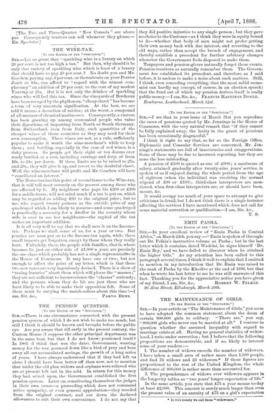THE WINE-TAX.
[To THE EDITOR OF THE " SPECTATOR:]
Sin,—Let us grant that "sparkling wine is a luxury on which 20 per cent. is not too high a tax." But then, why should it be only that variety of sparkling wine which is least of a luxury that should have to pay 20 per cent. No doubt you and Mr. G oschen, paying, say, 6 per cent. or thereabouts on your Perrier Jolla at 84s., can afford to "regard with the utmost com- placency" an addition of 20 per cent. to the cost of ray modest Vouvray at 25s. But it is not only the drinker of sparkling wines who will feel this tax. Since the vineyards of Bordeaux have been ravaged by the phylloxera, "cheap claret " has become a term of very uncertain signification. At the best, we are told it means a decoction of raisins ; at the worst, a compound of all manner of chemical nastinesses. Consequently, a custom has been growing up among economical people who value their digestions, of importing from North or South Germany, from Switzerland, even from Italy, such quantities of the cheaper wines of those countries as they may need for their own consumption. These wines arc not, as a rule, sufficiently popular to make it worth the wine-merchant's while to keep them ; and bottling, especially in the case of red wines, is a risky process. So people get their eight or ten dozens over ready bottled, at a cost, including carriage and duty, of from 16s. to 24s. per dozen. If these limits are to be raised to 21s. and 29s., they will give it up, and revert to the doubtful claret. Well, the wine-merchant will profit, and Mr. Goschen will have "conciliated an interest."
The Horse-tax has this point of resemblance to the Wine-tax, that it will tell most severely on the poorest among those who are affected by it. My neighbour who pays his 2200 or 2300 for a saddle-horse, will not mind much if a tax is put on, which may be regarded as adding 230 to the original price; but to me, who regard twenty guineas as the outside price of any quadruped which I am likely to possess—and some quadruped is practically a necessity for a dweller in the country whose wife is ever to see her neighbours—the capital of the tax makes an important addition.
It is all very well to say that we shall save it on the Income- tax. Perhaps we shall, some of us, for a year or two. But pennies are soon put on to the Income-tax again, while these small imposts get forgotten, except by those whom they really hurt. Unluckily, these, the people with families, that is, whose incomes lie just on either side of 21,000 a year, are precisely the one class which probably has not a single representative in the House of Commons. It may have one or two ; but not enough to affect the point of my letter, which is that these two new taxes are very ingeniously devised. There is a show of "taxing luxuries" about them which will please the "masses ;" they are not sufficient to inconvenience the "classes" seriously; and the persons whom they do hit are just those who are least likely to be able to make their opposition felt. Some of them must be envying the match-sellers about this time !—I


































 Previous page
Previous page